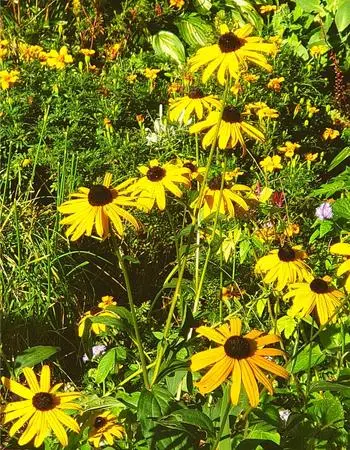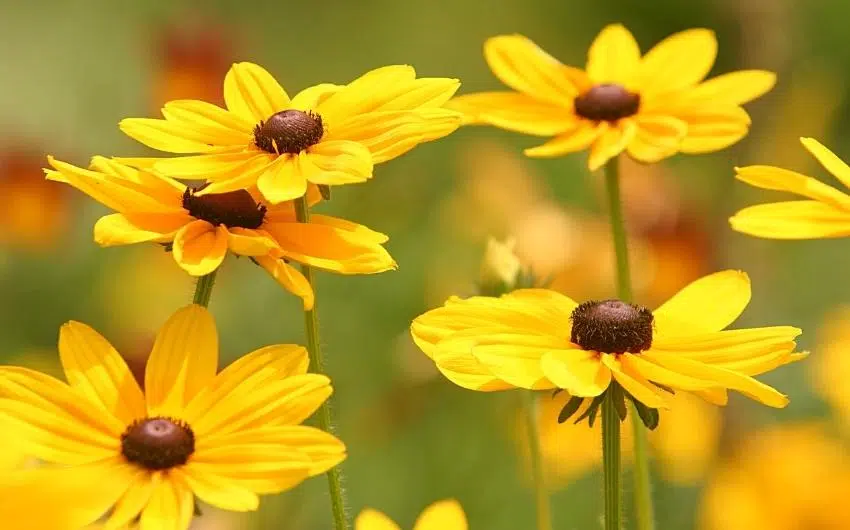When most people think about deer eating plants in their garden, they typically worry about the more significant, showier plants – like roses or hostas. But what about those ubiquitous black-eyed Susans? Do deer eat black eyed Susans?
Will Deer Eat Black Eyed Susans? Many people wonder if deer will eat them and if they are resistant to deer damage.
In this blog post, we’ll explore whether deer eat Susans and offer some tips on how to protect these plants from deer damage.

Quick Jump
ToggleDo Deer Eat Black Eyed Susans? – (Will Deer Eat Black Eyed Susans)
Do Deer Eat Black-Eyed Susans? Deer don’t usually eat Black Eyed Susans, as they stay far away from the plant. The flowers have a rank smell that wards off most would-be grazers. Even so, young plants and seedlings are still vulnerable to deer damage.
Here are some tips to protect black-eyed Susans from deer attacks:
How to Protect Susans from Deer? If you live in an area with a high deer population, it’s best to take precautions to protect your plants. Here are some tips:
- Use fencing: A fence is the best way to keep deer out of your garden. Make sure the fence is at least 8 feet tall and made of sturdy material.
- Plant in groups: Deer are more likely to eat isolated plants. Planting black-eyed Susans in groups will make them less likely to be eaten.
- Use deer repellents: There are several commercial deer repellents available. Mixing water, vinegar, and garlic can also make your own.
These tips will help ensure that your Susans are safe from deer damage.
Why Are Deer Eating My Black-Eyed Susans?
Deer are eating your black-eyed Susans because they’re in the mood for something different.
Seriously, though, deer will eat just about anything when they’re hungry, and Susans are one of their favorite plants.
That’s because there aren’t many things that grow in the winter, so deer are especially drawn to plants like Susans, which still have some leaves and dark brown centers.
How to Protect Black Eyed Susans from Deer? (DIY Small Gardens DEER FENCE )
Every year we plant beautiful Black Eyed Susans in our garden, and every year the deer come and eat them all. It’s so frustrating! We work hard to grow these flowers, and then the deer come and cut flowers.
Watch this video to learn how to protect your Black Eyed Susans from deer using a DIY deer fence. This easy, inexpensive project can be completed in under 1 hour, and it will keep those pesky deer away from your growing plants.
Do Black Eyed Susans Come Back Every Year?
If you’re asking whether Black Eyed Susans ( Rudbeckia hirta ) will come back every year, the answer is a bit complicated.
That’s because there are both perennial plants and annual types of Black Eyed Susans. The best way to ensure that your Susans come back every year is to plant a mix of both types.
Perennial Black Eyed Susans, also known as woody or biennial Susans, are native plants in North America.
Annual black-eyed Susans, on the other hand, are members of the daisy family originating from Europe and Asia. Both plants have deep roots and vining stems with large flower heads reaching 6 inches in diameter.
Perennial Black-Eyed Susans will come back year after year, while annual Black-Eyed Susans will need to be replanted each year.
So, if you want Black Eyed Susans in your garden every year, make sure to plant a mix of both types!
When Do Black Eyed Susans Bloom?
Black Eyed Susans bloom from June to September. This is the time when they are most visible and beautiful. Make sure to enjoy them while they are in season!
If you want to prolong the blooming season of your Susans, make sure to deadhead them regularly. Deadheading is the process of removing spent flowers from the plant. This will encourage the plant to produce more flowers.
To deadhead Black Eyed Susans, snip off the flower heads at the base of the plant. You can do this with your fingers or a pair of scissors.
What Animal Eats Black-Eyed Susan Plants?
What Animals Eat Black-Eyed Susans? All sorts of animals love Susans! Rabbits are especially fond of them and often munch on the leaves and flowers. Even deer will occasionally nibble on the foliage.
However, Susans are technically edible for humans too! The young leaves can be used in salads, while the older leaves can be cooked like spinach.
The petals and dark centers attract butterflies and make a pretty (and edible) garnish for salads or desserts. So next time you see a Susan, don’t be afraid to give it a try…who knows, you might find yourself liking it!
What Flower Deer Will Not Eat?
Deer will not eat daffodils, foxgloves, and poppies because these flowers have toxicity that deer avoid. Daffodils, foxgloves, and poppies contain toxins that can harm or even kill deer.
Deer are also not particularly fond of the taste of marigolds, petunias, and impatiens. So if you’re looking for flowers deer will not eat, these are good choices.
Of course, no plant is 100% deer-proof. There are always exceptions to the rule. So even if a plant is not on the list of deer to avoid, it’s still possible that deer will eat it.
If you’re concerned about deer eating your plants, the best way to protect them is to build a fence around them. A deer fence will keep deer out of your garden and allow your growing plants to thrive.
Do Deer Eat Coneflowers?
No, deer do not eat coneflowers. Coneflowers are not a very palatable plant for deer, so they avoid eating them.
Another reason deer may avoid eating coneflowers is that the plant can be toxic to them in large quantities. So, if you’re looking to keep deer away from your garden, planting some coneflowers may be a good idea!
Commonly Asked Questions about Black Eyed Susan Deer (FAQ)
What Is Eating My Black-Eyed Susan Flowers?
There are a few possible culprits, but the most likely offender is rabbits. Rabbits love to eat flowers, and black-eyed Susans are no exception. Another possibility is deer. Deer will occasionally nibble on the foliage of Susans, but they are not as likely to cut flowers.
If you’re unsure what’s eating your Susans, the best way to find out is to set up a game camera in your garden. This will allow you to see what’s coming into your garden and eat your plants.
Do Rabbits Eat Black-Eyed Susans?
Yes, rabbits love to eat black-eyed Susans! The flowers, yellow petals, rough leaves, and stems are very palatable to rabbits, so if you have rabbits in your area, they will likely be munching on your Susans.
Do Deer Eat Shasta Daisies?
Shasta daisies are common flowers that tolerate rabbits, deer, and groundhogs. They are easy to grow in full sun and require little maintenance. Deer enjoy eating the leaves of Shasta daisies, but they don’t typically eat the flowers.
If you have a problem with deer eating your Shasta daisies, you can try planting them in an enclosed area or spraying them with a commercial deer repellent.
Do Deer Eat Black Eyed Susan Vine?
No, deer do not eat black-eyed Susan vine. This plant is not very palatable to deer, so they avoid eating it. However, if you have a problem with deer eating your black-eyed Susan vine, you can try planting it in an enclosed area or spraying it with a commercial deer repellent.
What Are Deer Resistant Perennials?
There are some perennials that deer avoid eating. These include black-eyed Susans, daffodils, foxgloves, poppies, marigolds, petunias, and impatiens.
Do Deer Eat Rudbeckia?
Yes, deer will eat Rudbeckia if they are hungry enough. However, Rudbeckia is considered a deer-resistant perennial in the garden, so they are not likely to eat it if other food options are available. If you have a lot of deer in your area, you may want to consider planting other more palatable species.
Do Deer Eat Coreopsis?
Deer generally do not browse on Coreopsis, but they may eat the flowers if other food is scarce. However, the plant is seldom browsed by deer because it has a bitter taste.
Do Deer Eat Bee Balm?
From what I can tell, deer largely leave bee balm alone. I have seen a few cases of deer nibbling on the leaves, but it doesn’t seem to be a favorite food. So, if you’re worried about deer eating your bee balm, you can probably relax.
Do Deer Eat Phlox?
Deer usually don’t eat phlox, but they may nibble on the leaves if other food is scarce. The plant is not very palatable to deer, so they usually avoid eating it.
Do Woodchucks Eat Black-Eyed Susans?
Yes, woodchucks do eat black-eyed Susans. I’ve seen it firsthand in my garden. The woodchuck gnawed the coneflowers and black-eyed Susans to the ground. Fortunately, I could chase him off before he could do any more damage. If you have a woodchuck problem in your garden, I recommend taking steps to control them. Otherwise, they can wreak havoc on your growing plants!
Do Chipmunks Eat Black-Eyed Susans?
Yes, chipmunks love to eat black-eyed Susans! I’ve seen these little critters nibbling on the flowers and leaves of black-eyed Susans in my garden. If you have a chipmunk problem, I recommend taking steps to control them.
Do Deer Eat Hostas?
Yes, deer love and actively seek out Hostas. They can decimate a garden in no time if you’re not careful. The best way to protect your Hostas is to fence them in or use a repellent.
Do Groundhogs Eat Black-Eyed Susans?
Yes, groundhogs love to eat black-eyed Susans! I’ve seen these critters chewing on the flowers and leaves of black-eyed Susans in my garden.
Conclusion
So, the answer to our question” do deer eat black eyed Susans?” is yes – deer will eat black-eyed Susans. However, they are not particularly drawn to them, so you don’t have to worry too much about your garden being devoured by these herbivores. If you’re looking for a more deer-resistant flower to plant in your garden, consider some of the other options we’ve listed. Thanks for following along on our journey through the world of deer-eating flowers!
You might also like
- Do Deer Eat Mums Plants? – Deer Proof Your Garden Today!
- Do Deer Eat Beech Nuts? Whitetail Food, Beechnuts VS Acorns
- How Can You Show Respect For Natural Resources? (Explained)
- Do Deer Eat Oranges? – The Surprising Answer! (Revealed)
- Do Deer Eat Walnuts? The Answer May SHOCK You!
- Do Deer Eat Iris Flowers? – 15 Plants Deers Won’t Eat (List)
- Can Deer Eat Bread? – What To Feed Deer In Backyard? (Guide)


